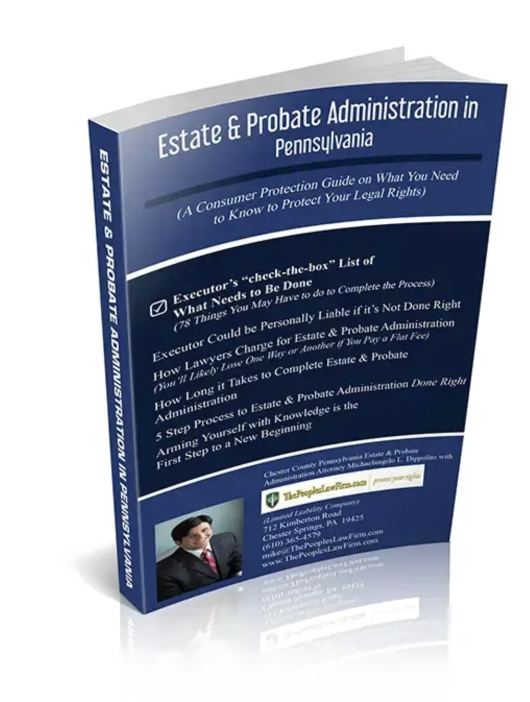Coatesville residents are busy and productive, leading them to accumulate estates of varying sizes and value. Although it may be true that we cannot “take it with us when we die,” we can leave a lasting legacy for loved ones.
For many people, that is the entire purpose of growing an estate and naming a trusted family member as a personal representative.
Despite the honor of knowing a loved one trusted you to carry out their wishes after their death, facing a complex legal process with little or no experience in the legal realm may feel overwhelming.
Fortunately, you have the option of hiring an experienced Coatesville estate administration and probate lawyer to provide legal counsel and guide you through each step of the process, minimizing the possibility of costly errors.
Instead of moving forward without counsel, contact the Pennsylvania probate lawyers at ThePeoplesLawFirm.com about your estate administration and probate case in Coatesville.
Why ThePeoplesLawFirm.com Might Be Right for Your Probate Requirements In Coatesville
Even when an estate isn’t large and the process appears straightforward, it’s far from uncommon for problems to arise during probate. For large estates with diverse holdings, it quickly becomes challenging.
By choosing legal counsel with ThePeoplesLawFirm.com for your Coatesville estate administration case, you’ll have the following advantages throughout the probate process:
- An experienced estate estate administration and probate lawyer in Coatesville with decades of accumulated knowledge at your side throughout the process
- An attorney with over 26 years of experience in probate law to ensure a smooth, efficient process from start to completion
- Compassionate legal services with an attorney who always considers the emotional aspects of a death in the family, as well as the financial and legal requirements of probate
Attorney Michaelangelo L. Dippolito offers a free phone consultation so you can learn more about the advantages of legal representation during the estate administration process.
Who Can Manage Probate and Estate Administration After a Death?
Regardless of how many beneficiaries are named in a will, only the personal representative (executor) of the estate designated by the decedent becomes the probate administrator after the death.
The estate administrator is a fiduciary for the estate, with the legal responsibility to act in the best interests of the estate and heirs throughout the probate process.
When an individual with assets dies without a will, the probate court may choose a close family member as the estate administrator, or a family member, such as a spouse, parent, adult child, or sibling, may come forward and volunteer for this duty.
What Steps Are Required for Estate Administration In Coatesville, PA?
It takes time to grieve the loss of a family member and carry out a funeral, burial, and other immediate obligations after a death. Soon after the funeral, most estate administrators begin the probate process, which requires the following steps:
- First, it’s necessary to find the will and compile relevant documents such as life insurance policies, living trust documents, and certified copies of the death certificate
- Then, the will must be filed along with the death certificate at the county’s Will Register Office
- The estate administrator files a petition with the probate court to open a probate case and then receives letters of authorization to proceed
- Under Title 20, Chapter 31, Section 25, the probate court issues authority to the estate administrator through “Letters Testamentary” when the executor is named in a will or through “Letters of Administration” when there is no will
- It’s the estate administrator’s duty to notify the beneficiaries, tax agencies, and any creditors
- Pennsylvania requires a public notice of probate placed in newspapers to alert unknown creditors to the death and the opening of probate
- The estate administrator inventories the estate and lists all assets, debts, and tax obligations
- It’s necessary to resolve all debts against the estate through the methods described in the will, sometimes requiring the sale of one or more assets or property
- Finally, the remainder of the estate is distributed to the beneficiaries through the will’s direction or according to Pennsylvania’s inheritance law if there is no estate plan
Creditors have up to one year from the date of the death to file a claim for payment against the estate. The public notice placed in local newspapers serves as a time indicator to creditors.
If My Loved One’s Estate Is Small, Does It Still Have to Go Through Probate?
Any estate with real estate property and/or an assessed value of over $50,000 requires the full probate process; however, if your loved one’s estate is valued at less than $50,000 and does not include real estate property, you may use Pennsylvania’s Small Estate Probate.
This is an abbreviated process that requires the estate administrator to file an affidavit to the probate court showing the assets and their assessed value. Then, the probate court authorizes the administrator to distribute the assets to the appropriate beneficiaries without the lengthier process.
Can Some Assets Bypass the Probate Process?
Life insurance benefits are paid directly to a beneficiary without having to pass through the probate court. Similarly, assets held in a living trust don’t require probate. If the decedent’s bank accounts have a transfer-on-death (TOD) or pay-on-death (POD) designation, the designee can immediately access the funds in the account by producing a certified copy of the death certificate.
In many cases, the designee in a TOD account is the personal representative of the estate. If there are sufficient funds available, they may benefit the estate by paying taxes or debts against it and facilitating a faster probate process.
Contact a Coatesville Estate Administration and Probate Attorney at ThePeoplesLawFirm.com
Errors, oversights, and missteps can complicate probate and estate administration, leading to conflicts and delays. In the worst cases, a mistake could leave the probate administrator personally responsible for financial deficits, even for an honest error or oversight.
Instead of taking chances, you can relieve anxiety and ensure the most efficient process possible by hiring an attorney to guide you through the Pennsylvania probate process. Contact ThePeoplesLawFirm.com today to learn more about the advantages of obtaining legal counsel during this sensitive time.





